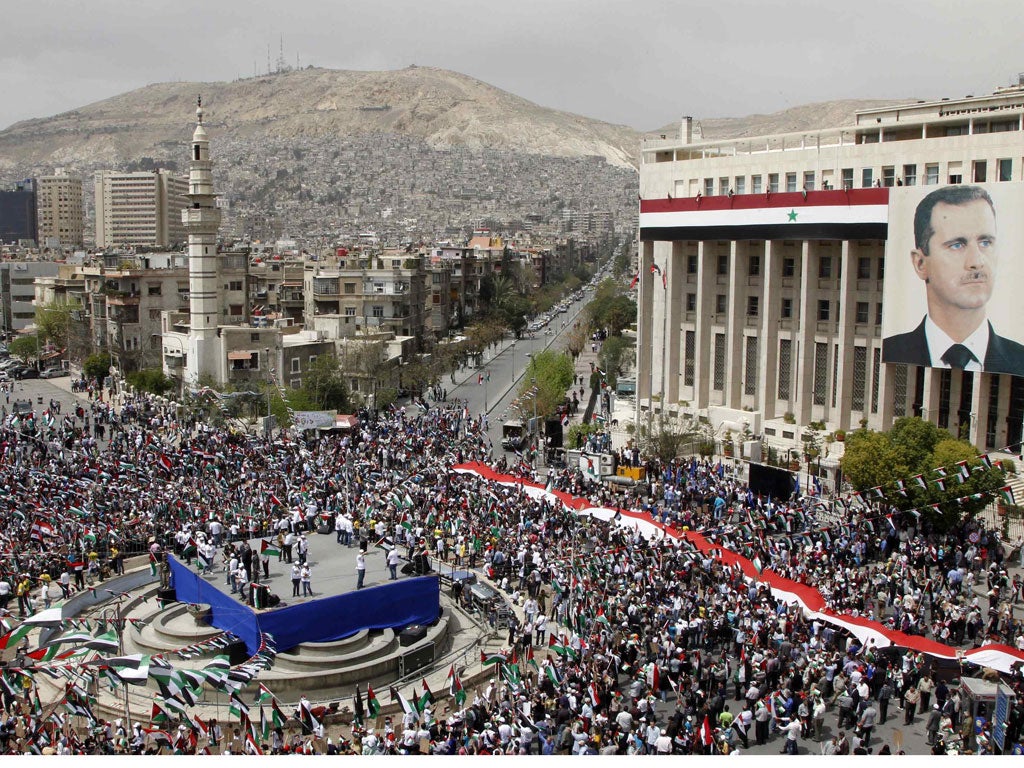
Your support helps us to tell the story
This election is still a dead heat, according to most polls. In a fight with such wafer-thin margins, we need reporters on the ground talking to the people Trump and Harris are courting. Your support allows us to keep sending journalists to the story.
The Independent is trusted by 27 million Americans from across the entire political spectrum every month. Unlike many other quality news outlets, we choose not to lock you out of our reporting and analysis with paywalls. But quality journalism must still be paid for.
Help us keep bring these critical stories to light. Your support makes all the difference.
As one of Israel’s staunchest opponents in the Middle East, Syria has long held a difficult position internationally. Following the government’s repressive response to 2011’s pro-democracy demonstrations, the nation has become increasingly isolated.
President Bashar-al-Assad’s concession to lift the 48-year state of emergency in April 2011, initially a key demand of the protesters, came too late to restore order, as focus shifted to ousting the President. Amid continued brutality, thousands of Syrians fled to refugee camps across the Turkish border and in November the Arab League voted to suspend Syria.
In contrast to the swift military action taken against the Libyan authorities, the international community has shown reluctance to intervene in Syria. The UN resolution to end the violence was vetoed by Russia and China, and the promise of ceasefire secured by Kofi Annan now rings hollow.
Attention was briefly diverted to the president’s London-born wife when leaked emails revealed she had been shopping while Syria burned. Meanwhile Russia continues to urge peace through occasionally eccentric means.
The Numbers
9000 – Estimated number of people killed in the year following the uprising. Source: Reuters
£2,650 – Price-tag of a vase Asma al-Assad ordered from Harrods in June 2011. Source: The Guardian
24,324 – Number of Syrian refugees in Turkey in April 2012. Source: The Daily Beast
$4.7bn – Value of Russian arms deals with Syria, as of 2010. Source: The New York Times
Further Reading
Freedom, democracy and human rights in Syria, Robert Fisk, The Independent, 2010
Neighbours from hell: how Syria’s war hit an Acton street, Rob Hastings, The Independent, 2012
The Only Remaining Online Copy of Vogue’s Asma al-Assad Profile, Max Fisher, the Atlantic, 2012
Q&A: Nir Rosen’s predictions for Syria, Nir Rosen, Al Jazeera, 2012
Why Don’t We Care About Syria? Emily Parker, Slate, 2012
Timeline
1946 – Syria gains its independence from France
1963 – Baath party takes control
1982 – Government crushes an uprising of the Muslim Brotherhood in Hama, killing tens of thousands
2000 – Bashar al-Assad is appointed leader of the Ba’ath Party and elected president unopposed
March 2011 – Thousands march in Syria, demanding an end to 48 years of emergency law
Nov 2011 – The Arab League votes to impose economic sanctions on Syria
February 2012 – Russia and China veto a UN security council resolution calling for President Assad to step down
March 2012 - Acting as joint UN-Arab League envoy, Kofi Annan meets with President Assad to propose a cease-fire
May 2012 - 108 people, many of them children, are massacred by the Syrian regime army in Houla. Several nations, including the UK, respond by expelling Syrian diplomats
Subscribe to Independent Premium to bookmark this article
Want to bookmark your favourite articles and stories to read or reference later? Start your Independent Premium subscription today.
Join our commenting forum
Join thought-provoking conversations, follow other Independent readers and see their replies
Comments